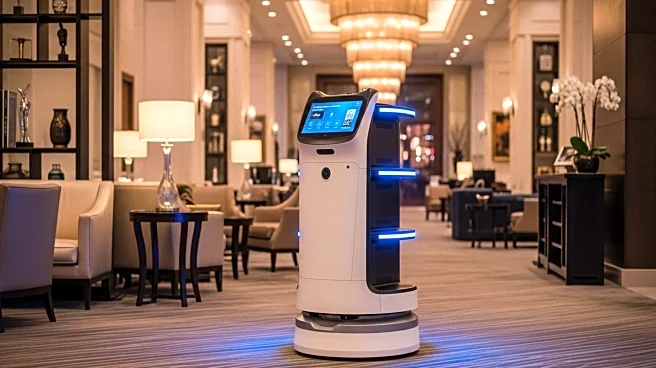What's Happening?
The hospitality industry is increasingly adopting AI-powered tools to improve decision-making processes and enhance guest experiences. AI is being utilized to provide real-time comparative analysis against competitors, allowing hotel executives to make informed decisions quickly. This technology helps in predicting demand, optimizing pricing, and identifying potential risks early. By analyzing booking behaviors, stay patterns, and guest feedback, AI offers insights that are not apparent in traditional reports, enabling hotels to tailor their services to meet guest preferences more effectively. The integration of AI in hospitality is transforming how hotel groups manage their portfolios, shifting from reactive to proactive strategies.
Why It's Important?
The integration of AI in the hospitality sector is significant as it offers a competitive edge in a rapidly evolving market. By providing real-time data and predictive analytics, AI helps hotel executives make strategic decisions that can lead to increased revenue and improved guest satisfaction. The ability to forecast demand and optimize pricing dynamically ensures that hotels can maintain healthy occupancy rates and maximize revenue without compromising guest experience. This technological advancement also allows for better resource planning, reducing waste and improving operational efficiency. As AI continues to evolve, it is expected to play a crucial role in shaping the future of hospitality, making it essential for industry leaders to embrace these tools.
What's Next?
As AI becomes more integrated into the hospitality industry, hotel executives are likely to continue exploring its capabilities to further enhance decision-making and guest experiences. The focus will be on refining AI models to provide even more accurate predictions and insights. Additionally, there may be increased collaboration between AI developers and hospitality leaders to tailor AI solutions specifically for the industry's needs. The ongoing development of AI technology will likely lead to new applications and innovations, further transforming the hospitality landscape. Stakeholders in the industry will need to stay informed and adapt to these changes to remain competitive.
Beyond the Headlines
The adoption of AI in hospitality raises several ethical and cultural considerations. As AI systems become more prevalent, issues related to data privacy and security will need to be addressed to ensure guest information is protected. Additionally, the shift towards AI-driven decision-making may impact employment within the industry, as certain roles may become automated. It is crucial for hospitality leaders to balance technological advancements with human-centric approaches to maintain a personalized guest experience. The long-term implications of AI integration will likely influence industry standards and practices, necessitating ongoing dialogue and adaptation.









